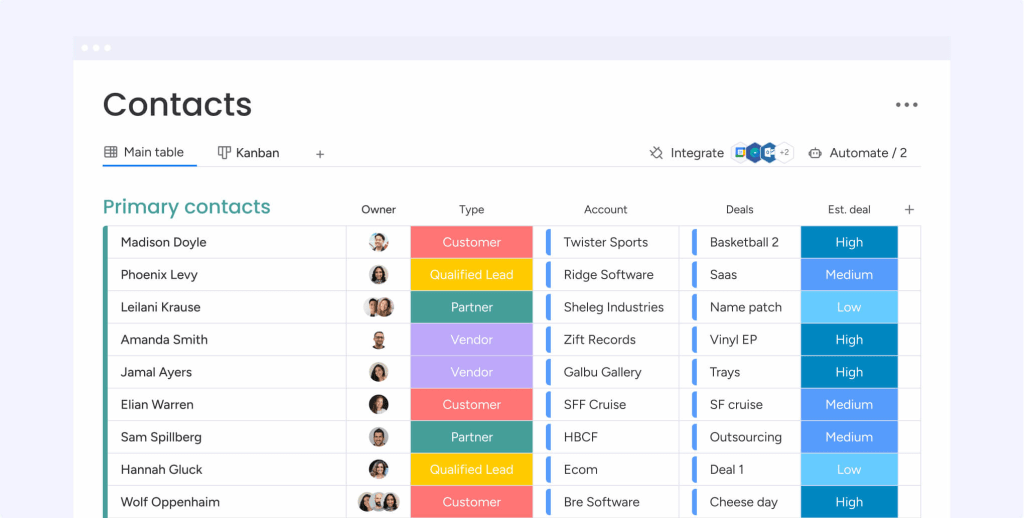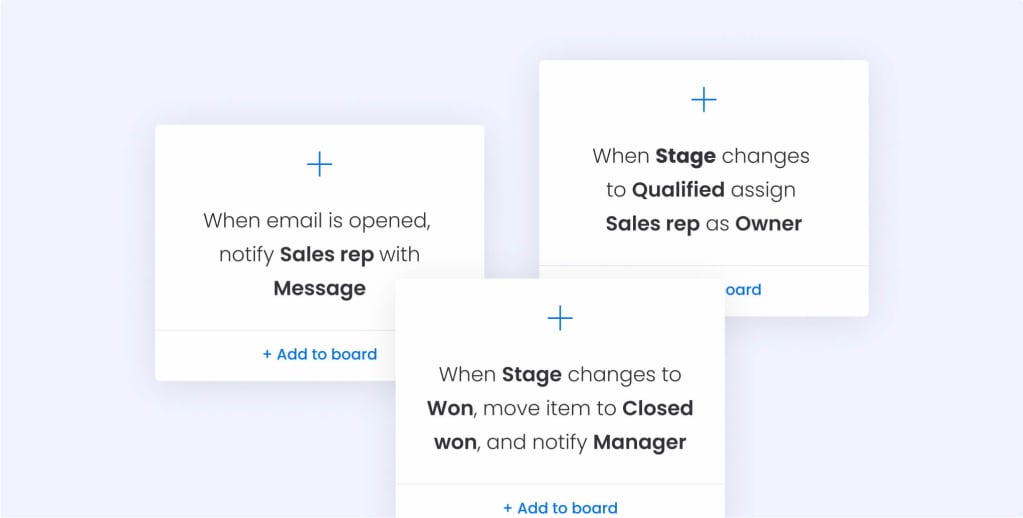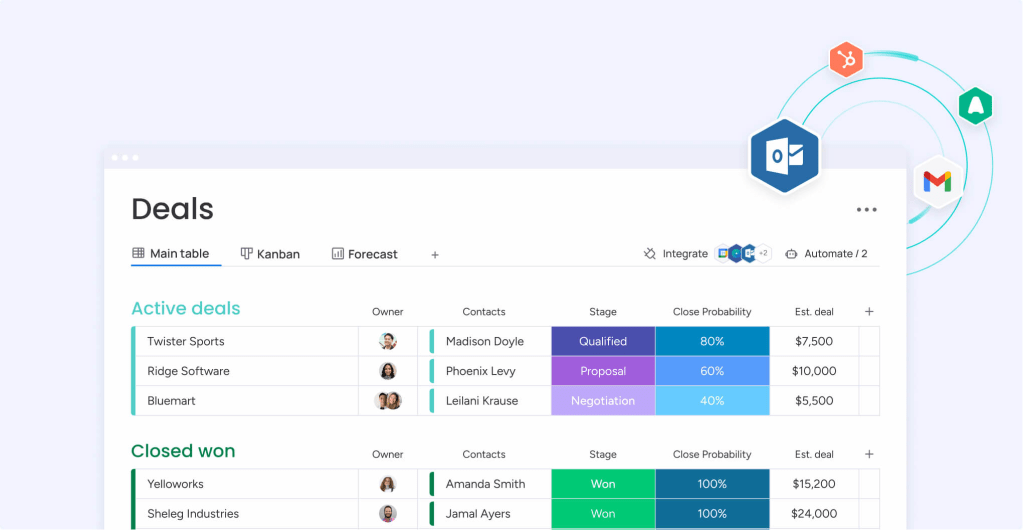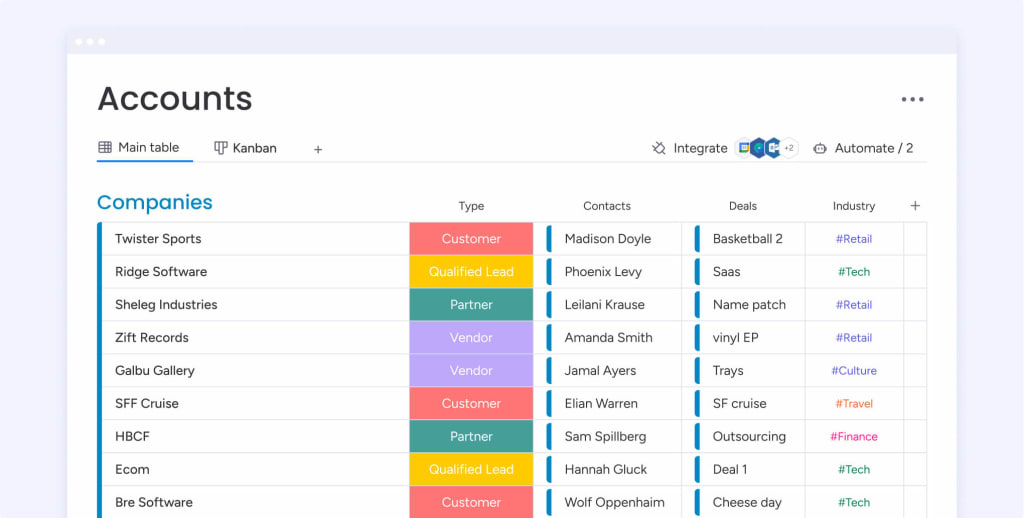The terms customer service and customer support are often used interchangeably, and while both refer to ways of assisting customers, they differ in their approaches. In order to provide the best experience for your customers and ensure a high rate of satisfaction, it’s important to have a good understanding of both.
This blog post will look at both customer service and customer support, outline the difference between them, provide strategies for excelling at both, and explore how a CRM can help you provide the best customer experience.
Try monday sales CRMWhat is customer service?
Customer service refers to everything a business does to improve the customer experience throughout the purchasing journey. Customer service aims to help customers get as much value as possible out of a company’s products or services by answering basic questions, addressing concerns, helping with issues, and guiding customers before and after a purchase.
What is customer support?
Customer support is the process of solving specific problems related to the products or services a client gets from a company. Customer support teams might address technical issues and guide customers through steps to reach a resolution. Often, customer support is usually technical and found in industries like IT, SaaS, or e-commerce where customers might need quick answers to issues like installing or using a device or software.
Customer service vs customer support: Key differences
Both customer service and customer support help customers on their journey, but there are some key differences that set the two apart. Let’s take a look at them side-by-side to better understand where these two differ.
| Customer service | Customer support |
|---|---|
| Proactive - anticipates potential problems | Reactive - support solves existing problems |
| Applicable to entire customer lifecycle | Applies to technical difficulties |
| Relevant for all types of businesses | Relevant to businesses in IT, SaaS, etc. |
| Agents have general knowledge about a company’s products, services, operations, and policies | Agents have specific knowledge about products and services and how to troubleshoot |
| Focused on creating positive experiences in the long term | Short-term interaction with customers that’s transactional |
| Provides clear answers to questions | Provides multi-stage solutions to problems |
| Success measured by satisfaction | Success measured by efficiency |
Why customer service and customer support are both important
Both customer service and customer support are important aspects of the customer experience. Despite their differences, both customer service and customer support help boost a business’s image in more than one way:
- Improves satisfaction: Both types of services can lead to customer satisfaction after an interaction, which can increase repeat business
- Builds trust: Good support and service create a level of trust between a business and its customers when a company can be relied on to handle inquiries or problems professionally
- Creates customer loyalty: Customers who feel cared for are more likely to stay loyal to a brand, make repeat purchases, and become brand advocates by recommending it to others
- Manages reputation: Positive customer care experiences can help boost a company’s reputation to new potential clients, improving its overall image
- Helps retention: When customers are satisfied with a business’s service and feel loyal to a brand, they’re more likely to stay long-term customers
Essentially, what’s important about providing solid customer service and support is building the foundations of a positive relationship with your customers.
Together with other aspects of customer care, like customer education and customer onboarding, service and support contribute to your business’s growth, reputation, and sustainability.
Common challenges facing customer service and support
While there’s no denying the importance of both service and support, it’s not uncommon for companies to find them challenging. Here’s a look at some of the recurring challenges in these areas:
- Customer expectations: 61% of customers would leave for a competitor after just one negative experience, meaning customer expectations are higher than ever
- Knowledge gaps: Customer service or support reps with knowledge gaps can lead to a poor experience, making ongoing training critical to your team’s overall success
- Managing negative feedback: It’s easier to create a positive experience than turn a negative one into a positive one, but when negative feedback arises, it can be challenging to retain that customer and turn the situation around
- Offering personalized service: 90% of customers spend more when companies personalize their customer service, but balancing this level of personalization with efficiency can be difficult
- Lack of tools and resources: To provide good customer experiences, agents need resources and data on customers, products, services, company knowledge, and ways to communicate quickly, and without the right tools this can hinder their work
Strategies for providing excellent customer support and service
Providing a high level of customer support and services requires some strategizing. With the right strategies in place, you can ensure your team is creating positive customer experiences, quickly resolving issues, and proactively helping customers. Here are five strategies you can use for both customer service and support.
1. Employ the right customer service tools
Make sure your team has access to the right customer service tools, such as software that helps them manage customer inquiries. A CRM like monday sales CRM can be a helpful tool for both service and support teams as it enables them to track customer inquiries, communicate, and store data all in one place. Additionally, service and support teams can easily collaborate on the same customer inquiry, making handover smooth and efficient.
Try monday sales CRM2. Actively listen to feedback
Active listening skills are critical when it comes to offering service and support. When customers provide feedback during an interaction, in reviews, or through other avenues like forums, surveys, or social media, it’s important to ensure your team is taking note, demonstrating understanding, and using it to improve their processes.
3. Offer multichannel support
Make sure the right support teams are available on different channels, like phone, email, chat, social media, and more. This will allow you to provide support at every contact point and step of the customer journey.
For example, a customer service agent using a cloud contact center can monitor social media for mentions of your brand in comments, tags, or messages.
This way, if a client is experiencing a technical issue, your service agent can quickly put them in touch with the right support agent.
4. Focus on your team’s skills
It’s important not to overlook soft skills in the hiring process. Of course, technical skills matter, especially when forming a tech support team, but for client-facing roles, you also need to ensure agents are empathetic, patient, and solution-oriented. This should also be backed up by ongoing coaching and training.
5. Help customers help themselves
Sometimes, customers can help themselves without reaching out for support. A customer education program includes Knowledgebases, forums FAQs, chatbots, online tutorials, and video guides can all help customers find solutions on their own. These materials reduce the burden on your service and support teams so they’re more free to engage with customers with higher-level issues.
Empowering your service and support teams with monday sales CRM
A CRM system like monday sales CRM can enhance customer service and support by centralizing customer data and interactions on one platform. This way, different teams can access information quickly and provide more personalized experiences when it comes to issue resolution. Additionally, monday sales CRM makes it easy for your teams to automate repetitive tasks, gather reports, and streamline workflows — all of which help increase the overall service quality.
Let’s take a closer look at some of the features of monday sales CRM and how they can be helpful for service and support agents.
Task automation
monday sales CRM allows you to create custom automations so that you don’t need to worry about manual tasks. For example, you can create an automation that triggers an email to be sent to a client after you change the status of their inquiry in your board. This helps teams cut down on time and ensures those small yet important tasks don’t fall through the cracks.
Integrations
With over 200 different apps and integrations, you can continue using the work tools your team is used to. monday sales CRM connects with apps like Freshdesk, Service Buddy, Zendesk, and more, so that you can connect all of your support team tools in one place.
Collaboration tools
Users on monday sales CRM can add updates on each task, tag collaborators, or assign tasks to specific agents or departments to ensure the right person is handling each customer case. If a customer with a technical issue comes through a customer service channel, the agent can easily transfer all the information to a technical support representative in a few clicks.
Contact management

The synergy between customer support and customer service
Not all businesses will need both customer service and support, but for the ones that do, it’s essential that each they operate smoothly and collaboratively to deliver exceptional customer experiences. Seamless collaboration between both service and support helps ensure a customer-oriented approach to customer care, builds trust and loyalty, and enhances perceptions of your brand. Using a tool like monday sales CRM empowers customer care employees to work together and provide the best resolutions possible, regardless of whether it’s a general inquiry or a technical issue.
FAQs
What are the different types of customer service and support?
There are different ways to deliver service and support, such as over the phone, email, and chat. It can also be delivered through social media, FAQs, guides, or knowledgebases.
How can a CRM help with customer service?
A CRM centralizes customer data such as preferences, purchase history, and communication, helping agents offer personalized assistance while ensuring efficient issue resolution. It can also help with automation, follow-ups, reports, and more.
What is customer service vs customer experience vs customer support?
Customer service deals with helping customers when they have inquiries, problems, or require guidance, while customer support addresses more technical issues like troubleshooting. Customer experience is an overview of the customer’s entire journey with a brand and their overall satisfaction with products, services, and support.




